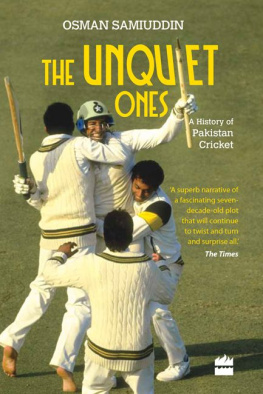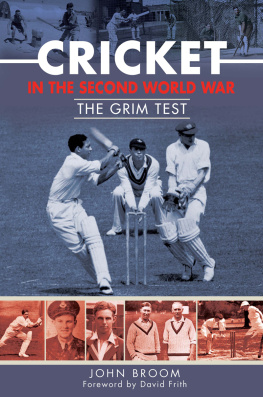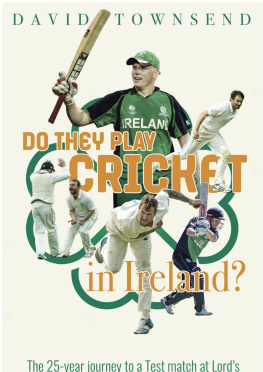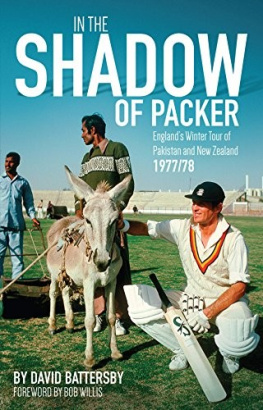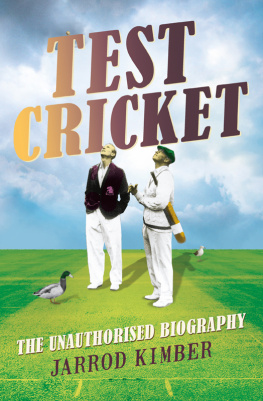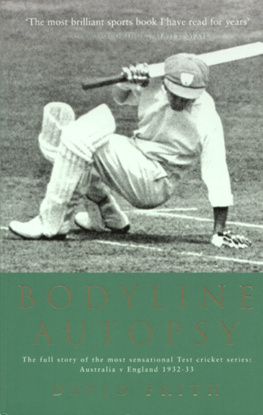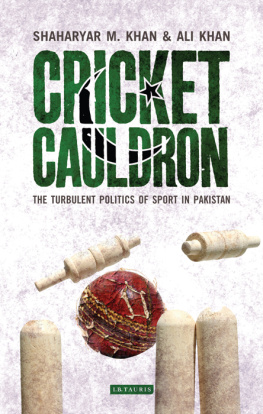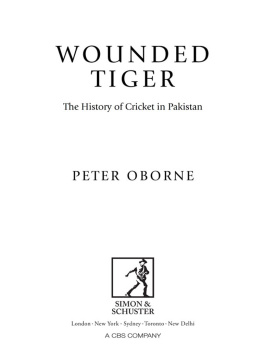THE UNQUiET ONES
A History of Pakistan Cricket
OSMAN SAMIUDDIN

For Abbu, who missed this, and Mama.
And my six girls.
Contents
3 March 2014 passed by without much retrospection. There was no time for it. There never is. When a country is in the process of hurtling violently and furiously towards its definition every single day, retrospection is an unnecessary pit stop. In fact, Pakistan woke up to another day of war a militant gun and bomb attack this time at a district court in Islamabad in which at least eleven people were killed. Soon it would be reduced to the coldness of a statistic, another number for news agencies to use, trying to smash down the complexity of war into digestible form. This time, it was by a group splintered from the terrorist mothership Tehreek-e-Taliban Pakistan, the militants who want to take over the country. This is no conventional war though, not least because any kind of war requires there to be another sidethe state in this casefighting back committedly and persistently. The Pakistani state has not. Soon there would be another attack, then another and then another; such has been the swarm of violence, the only feasible response to one attack is to wait for the next, and in the meantime, living on.
Had there been time or inclination for retrospection, it would have been noted that on a morning exactly five years ago, Pakistan cricket began its sixthand potentially most pivotalage. Terrorists struck a convoy carrying the Sri Lankan team from their hotel to Gaddafi Stadium in Lahore to play the third day of the second Test on that tour. Six people died and a number of Sri Lankan cricketers and match officials were injured. The Test was abandoned immediately, the touring players flown out, and international cricket came to a juddering halt in Pakistan. Until whenever it was to return, the last ball of that match was eventful and pregnant with symbolism: Salman Butt was run-out when there appeared no feasible way for a bowler to dismiss him. The needless self-inflicted damage represented a broader truth about the country, its cricket and the pass to which both had come. (Butt would also all but end his career by his own actions over a year later.)
So for all the transformation, the surge, the troughs, the development and the decay in the following pages, in a sense, we are still amidst what may yet be Pakistan crickets most significant age. Half a decade can feel a long time but in assessing the toll no international cricket will take on Pakistan, or how drastic its effect will be, it is not yet long enough.
A tangible imprint has been left on the economy of the game. The lack of home internationals has taken a financial toll, primarily because the cost of staging a home game outside the country has increased greatly. Since that fateful day, Pakistan has hosted the majority of its matches in the UAE, in addition to a couple of Tests in England. A rough estimate by Pakistan Cricket Board (PCB) officials places the cost of arranging each Test and one-day series in the UAE at approximately $1 million more than in Pakistan. But the consequences are not as dire as immediately imagined, or not yet anyway. The relocation to the UAE has also meant higher overall revenues. Pakistan covers the cost of staging matches there and shares money at the gate, which is also higher than what they would raise in Pakistan. Net gate income, for example, can touch close to a million dollars for tours, figures they couldnt imagine in Pakistan. Additionally, sponsorship with UAE-based companies generate bigger windfalls, sometimes almost double of what they would get from a sponsor in Pakistan. It may still not be profitable, but it has stanched the bleeding.
A very conservative estimate of the loss of potential revenues from cancelled and relocated tours would be around $100 million. It will take time before a more definitive picture can be drawn, however. And during that time, the PCB will consider bigger, trickier questions. Should they spend money on upgrading stadiums that are currently not making money and are considerably outmoded, compared to other venues around the world? Or should they risk letting them slide further, making cursory revamps and wait until they know world cricket will return before making that investment? In any case, they can hardly afford to build new stadiums, such as those the PCB has done recently in Islamabad and Sind, to appease political patrons; these are just white elephant stadia.
So deeply is cricket burrowed into the country, though, lets for a moment consider the impact of the attacks on other industries. In an evaluation of the effect, the PCB found that a car rental company they had contracts with, sold off half their fleet. A large number of their drivers were laid off; the PCB provided them a regular, steady tranche of business, employing their cars, busessome had been importedand drivers for fixed periods whenever cricket teams toured. The bigger hotels used to shape their budget around the prospect of a busy home season, with at least two international series, settling with the PCB in advance how many of their high-end, high-profit rooms would be booked during the winter. Hotel renovations were often approved with big tours in mind, and one hotel had to dismiss refurbishment plans once international cricket stopped. A multitude of other businesses, small, medium-sized and large, operating in the economy that cricket created have been similarly affected.
All this is just what we can measure. What of the effects on Pakistans players, for example? Some, like the young, promising batsman Azhar Ali, have never played an international match at home and may never do so. He and his contemporaries trained for years, attended camps and played domestic matches on the same grounds, in front of familiar crowds, of friends and family. Now they play without any of those comforts, a situation no other cricketer finds himself in. What of those aspiring to play for Pakistan? How will the absence of cricket in Pakistan shape them, not as athletes alone, but as humans? It takes a toll, on someone as senior as Younis Khan or as young as Junaid Khan. Travelling schedules for the international cricketer are ridiculous already, but what of a team that doesnt ever play at home? Transplanting a home season of four to five months abroad has begun to have a physical and mental impact on players, an impact they have done well to not use as an excuse.
And beyond the players, theres the game itself. Who can say how this age will play out, how not having matches to go to and not watching cricket stars will impact children? There is a partial precedent in the example of South Africa, who were banished from international cricket altogether for over two decades because of apartheid. They maintained their domestic set-up with rigour however, ensuring that when they did return at the end of 1991, the team was a strong one and domestic cricket robust. In a sense, their situation was even worse: not only was there no international cricket in the country, but their side was also barred from all international cricket.
A common reaction has been to wonder whether cricket will wither away. The prospect had actually been raised even before the Lahore attacks, over 2007 and 2008, by when a number of teams were already hesitant to tour Pakistan and the 2008 Champions Trophy had been shifted because of security concerns. After all, 9/11 and the ensuing war in Afghanistan affected no country as much as Pakistan; we should be talking of the tolls of over a decade, not just the last five years. Since that day, of all ten Test-playing countries, only Zimbabwe has played less Tests at home. The International Cricket Council (ICC) set up a task force to help, but as Pakistan lost itself in a maze of self-created crisesmost notably the spot-fixing scandal in 2010the remit of the task force expanded, bewildered by the realization that curing Pakistan cricket is an overwhelming task. Their eventual report in 2011 had sixty-three recommendations on better governance and the need for integrity, but very little on the prospects of surviving without international cricket. It was noble, but nobility will do little to lessen the impact of losses of over $150 million since 9/11.
Next page
